Key takeaways
- A musician’s portfolio should reflect their artistic journey, showcasing versatility and personal anecdotes that connect with audiences.
- Collaboration enhances creativity and skill development, offering diverse perspectives and opportunities for growth.
- Practicing with seasoned musicians provides personalized feedback, inspiration, and a deeper understanding of musical nuances.
- Mentorship fosters accountability and tailored learning, significantly accelerating a musician’s progress and emotional connection to music.
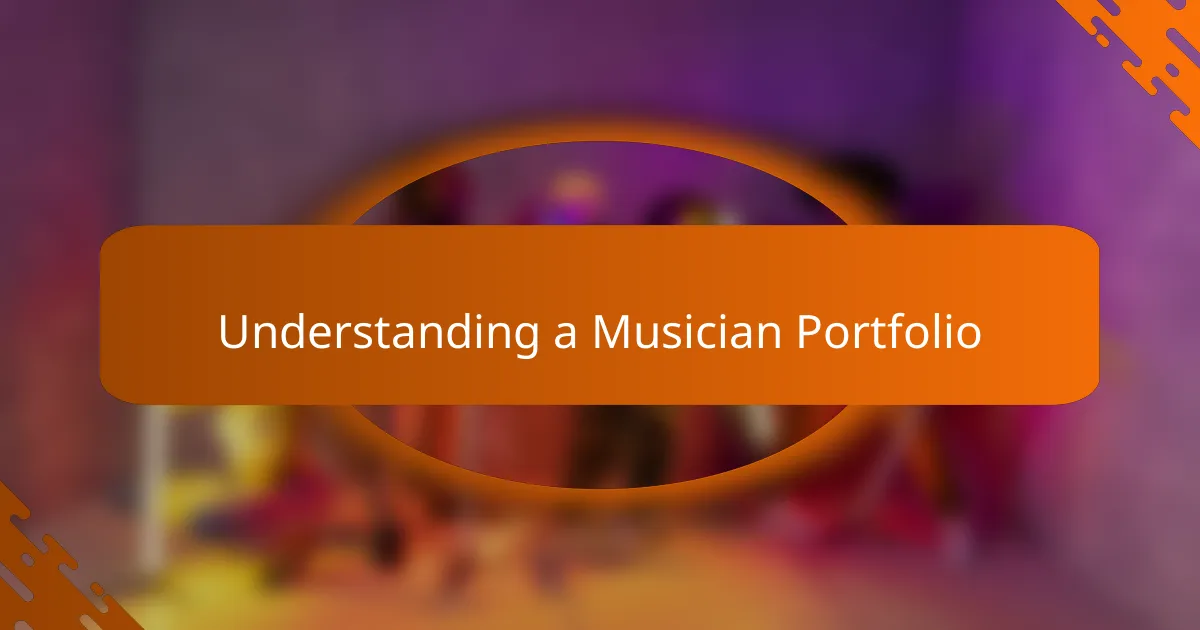
Understanding a musician portfolio
A musician’s portfolio is like a snapshot of their artistic journey. I remember when I first began compiling mine; it felt daunting yet exhilarating. It’s not just a collection of recordings or performances; it’s a reflection of who you are as an artist, showcasing your growth and evolution.
Think about what you want to convey through your portfolio. Are you highlighting your versatility, or perhaps your dedication to a specific genre? I often ask myself, what story do I want my audience to hear? Each piece in your portfolio should answer that question, resonating with your unique voice and style.
It’s essential to include more than just musical samples. Personal anecdotes, like the challenges faced during a performance or the joy of collaboration, breathe life into your portfolio. They invite listeners to connect with you on a deeper level, building a bridge between your experiences and their emotions. What moments stand out in your journey that you’d want to share?
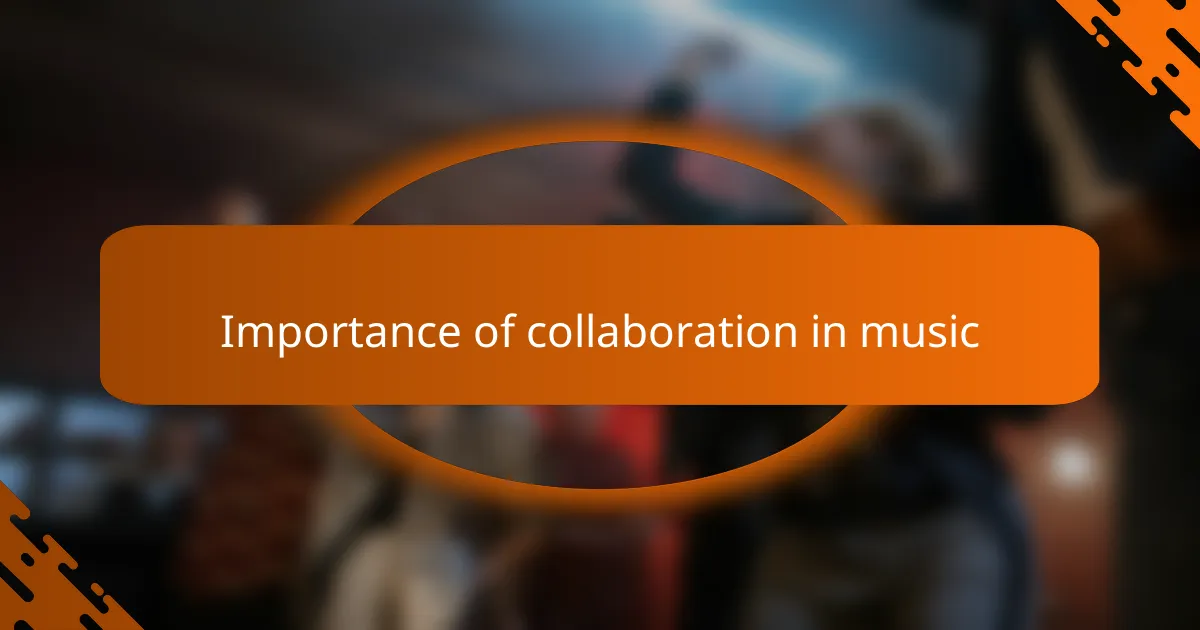
Importance of collaboration in music
Collaboration in music can transform an artist’s experience and output. When I think about the privilege of practicing with someone like Yo-Yo Ma, it’s clear that shared creativity can elevate one’s skills to new heights. I remember a session where his interpretation of a piece challenged me to think beyond my usual boundaries, pushing my own musicianship in unexpected ways.
Moreover, collaborating with other musicians fosters a sense of community. There’s something truly special about exchanging ideas and techniques—it creates a rich tapestry of sound that wouldn’t exist in isolation. I’ve learned that every collaboration is a lesson in humility and growth, revealing new dimensions of artistry.
Here’s a comparison table illustrating the differences between solo and collaborative music practice:
| Aspect | Solo Practice |
|---|---|
| Focus | Individual growth and technique |
| Feedback | Self-assessment |
| Creative Input | Limited to the individual |
| Learning | Self-paced |
| Collaboration Opportunities | None |
| Aspect | Collaborative Practice |
|---|---|
| Focus | Collective creativity and synergy |
| Feedback | Real-time input from peers |
| Creative Input | Multiple perspectives enrich the process |
| Learning | Enriched by others’ experiences |
| Collaboration Opportunities | Various, leading to new projects |
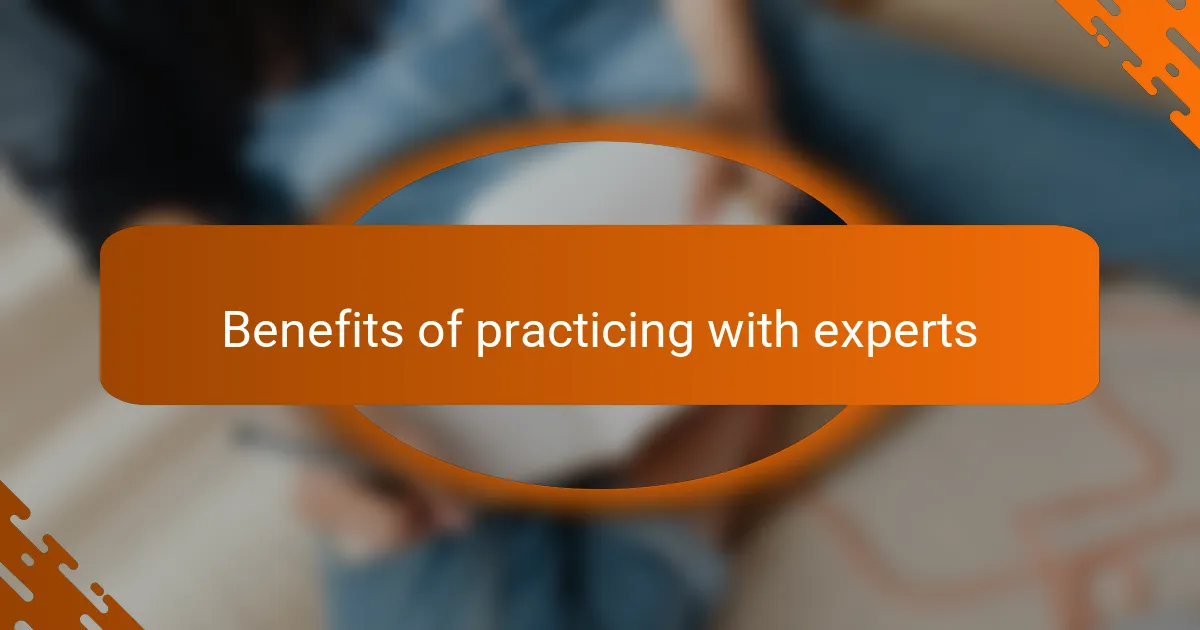
Benefits of practicing with experts
Practicing with experts like Yo-Yo Ma brings a wealth of benefits that can truly elevate a musician’s experience. For me, being able to observe his technique up close was transformative. I noticed how he approached each piece with a blend of passion and discipline that pushed me to refine my own practice habits.
Moreover, engaging with a seasoned musician not only accelerates skill development but also fosters a deeper understanding of the emotional nuances behind the music. I remember sitting in on a masterclass he led; it was eye-opening to hear him discuss the stories behind the compositions and how that informed his playing style. This perspective helped me connect with my own music on a more profound level.
- Direct feedback and personalized guidance tailored to your unique style.
- Inspiration drawn from witnessing their artistry and dedication.
- Exposure to advanced techniques and musical concepts.
- Enhanced motivation to practice and improve consistently.
- A deeper appreciation for the emotional aspects of music performance.
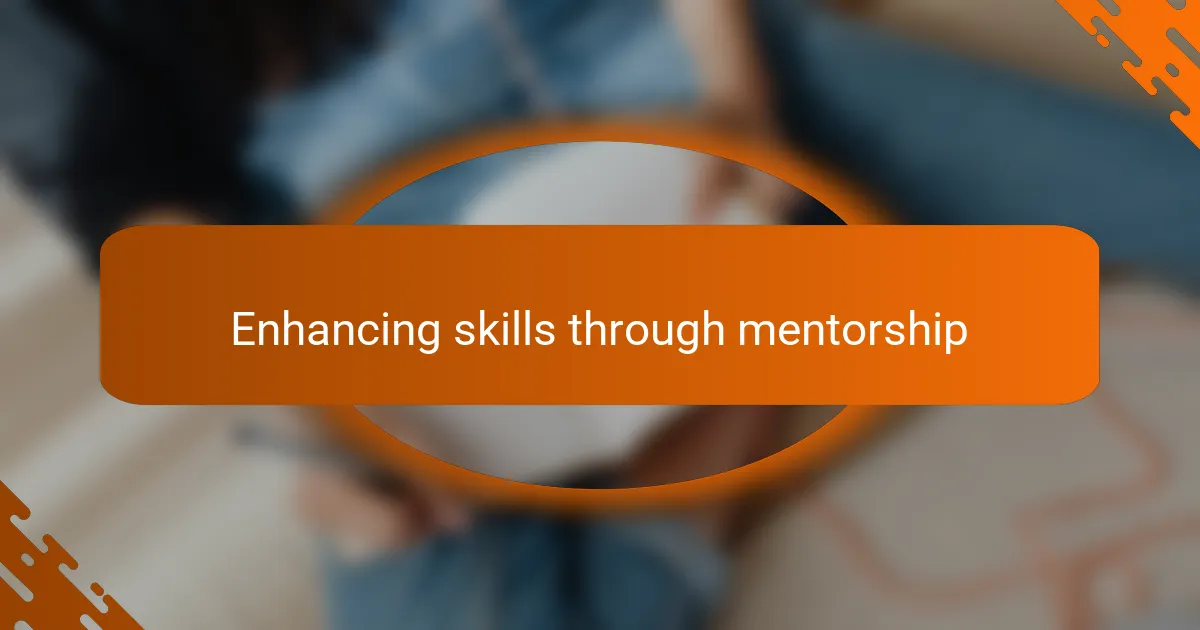
Enhancing skills through mentorship
Developing skills through mentorship can significantly enhance a musician’s journey. I remember when I practiced with a renowned instructor; the experience was nothing short of enlightening. Having someone who could provide tailored feedback was invaluable. It allowed me to bypass common pitfalls I’d faced in my learning process. Do you ever wonder how much faster you could grow with the right guidance?
Mentorship also brings a sense of accountability. When I committed to regular sessions with an expert, I felt a renewed motivation to practice effectively. It was like having someone cheering me on, pushing me to not only meet but exceed my own expectations. Have you experienced this kind of encouragement in your musical journey?
Furthermore, learning directly from someone with a wealth of experience offers insights that books or videos simply can’t provide. I recall a moment when my mentor demonstrated a subtle technique that transformed not just my playing but how I approached music altogether. The emotional connection I gained through that interaction was profound. It makes me think—what hidden gems of knowledge are waiting for you in a mentorship relationship?
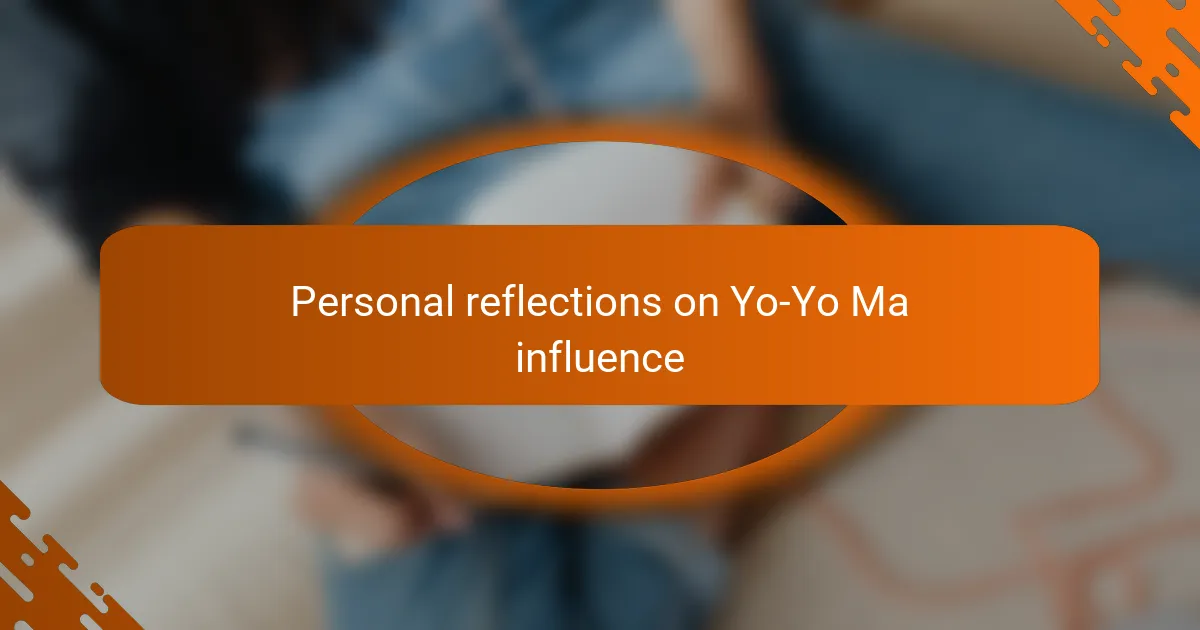
Personal reflections on Yo-Yo Ma influence
Yo-Yo Ma’s influence on my musical journey has been profound. I remember the first time I heard him perform; it wasn’t just the technical brilliance that struck me, but the emotion he infused into every note. It inspired me to look beyond technique and seek the soul of the music in my own practice.
In my experience, immersing myself in his recordings has taught me invaluable lessons about phrasing and interpretation. I often find myself pausing a piece mid-practice, reflecting on how Ma conveys stories through his cello—each pause resonates with emotion that I strive to emulate in my own playing.
- His ability to blend classical and contemporary styles encourages experimentation in my own performances.
- I admire how he emphasizes the importance of collaboration, reminding me that music is often a shared journey, not just a solitary pursuit.
- Listening to his music during stressful times serves as a reminder of the power of artistry to soothe and inspire.
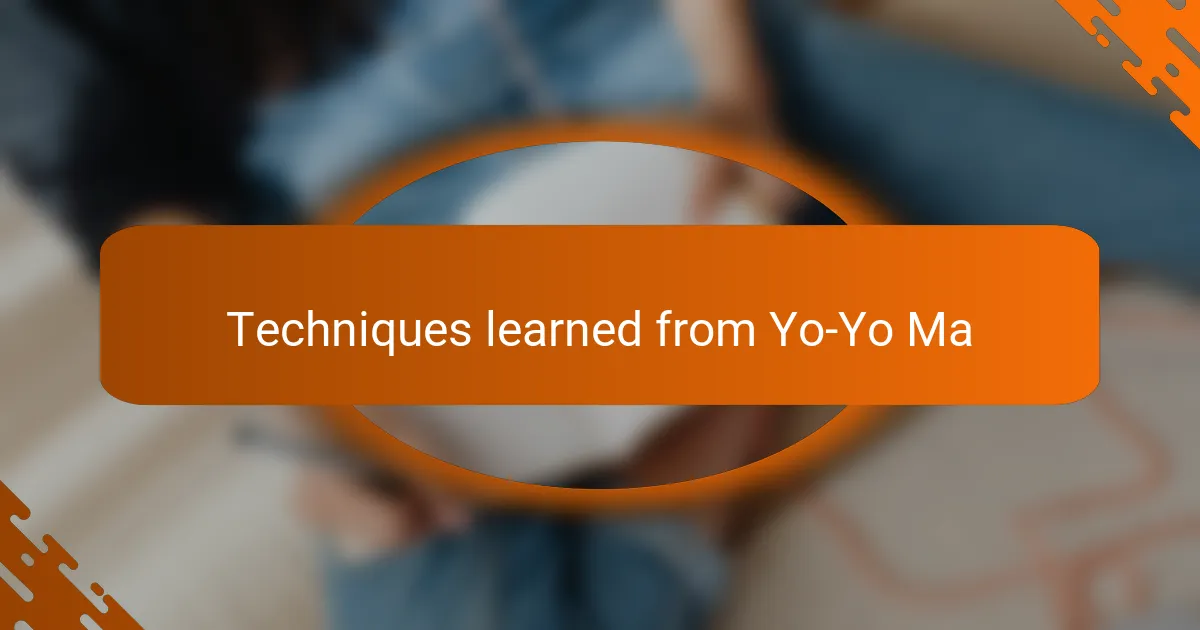
Techniques learned from Yo-Yo Ma
Practicing with Yo-Yo Ma has taught me the importance of emotional connection to the music. He emphasizes that technique is not just about perfection but about conveying feelings. When I first tried to emulate his style, I realized how essential it is to play with intention, allowing the music to resonate deeply within both me and the audience.
One of the standout techniques I’ve adopted is the concept of storytelling through music. Yo-Yo Ma often speaks about how each piece has a narrative, and this approach has transformed the way I interpret compositions. It’s vital to think beyond just the notes; I often ask myself, “What story does this piece want to tell?” It makes every practice session feel purposeful and fulfilling.
Moreover, I learned the value of patience and continuous growth. Yo-Yo Ma’s dedication to honing his craft inspires me daily. He’s a reminder that mastery takes time, and it’s the joy in the journey that truly matters.
| Technique | Description |
|---|---|
| Emotional Connectivity | Playing with intention to convey feelings. |
| Storytelling | Interpreting music as a narrative to enhance expression. |
| Patience | Understanding that mastery requires time and dedication. |